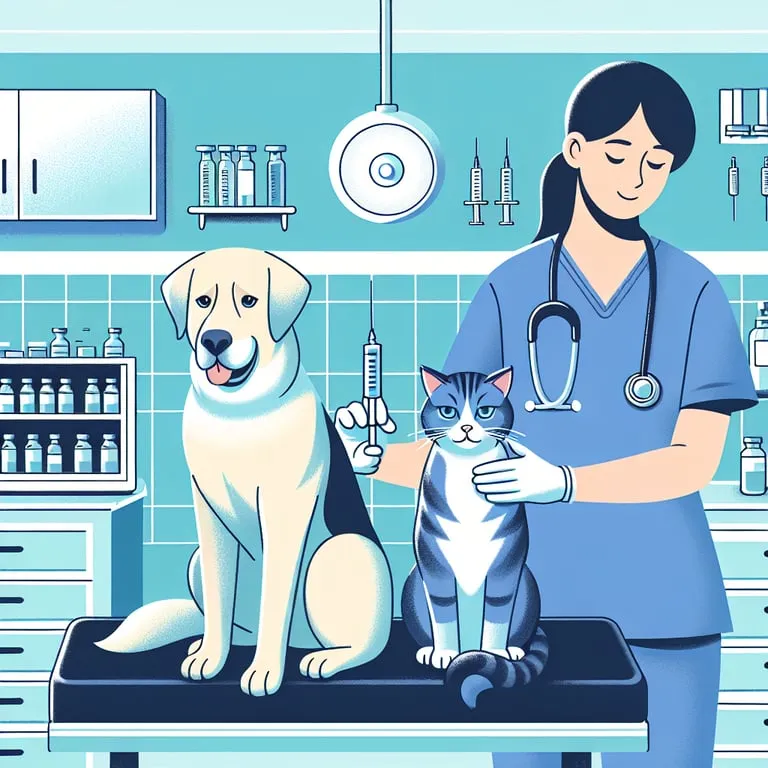In the realm of pet care, understanding the truth about pet vaccinations is not just essential but imperative for ensuring the health and safety of both your pets and the community. While misinformation about pet vaccines persists, it’s vital to separate myths from facts to make informed decisions for the well-being of our furry companions.

Understanding the Vital Role of Pet Vaccinations
Vaccinations serve as a critical component of preventive veterinary care, acting as a formidable protection against a host of infectious diseases. Yet, misconceptions about their necessity and safety persist. According to Dr. Nicole Azene, a respected veterinarian at the Onalaska Animal Hospital, “Vaccination is among the most effective strategies to shield pets from preventable diseases. The aim is not merely risk reduction — it’s ensuring that pets never confront these potentially life-threatening illnesses.”
The Safety of Vaccines
Contrary to pervasive myths, vaccines are not more dangerous than the diseases they aim to prevent. Thorough evaluations and stringent testing uphold vaccines as safe for use. Less than 1% of vaccinated animals exhibit adverse reactions, and significant side effects are a rarity. Typically, such responses are mild, manifesting as temporary soreness or fatigue. Modern veterinary vaccines derive from decades of scientific research, boasting a robust safety profile.
Dispelling Myths Around Pet Vaccinations
Many pet owners remain skeptical, often attributing undue risks to vaccines. Clarifying these myths is crucial to enhancing overall pet care.
Myth 1: Indoor Pets Don’t Require Vaccinations
It’s a common misconception that an indoor lifestyle sufficiently protects pets from infectious diseases. In reality, pathogens can easily infiltrate homes through wildlife encounters, mosquito bites, or human visitors exposed to other animals. Diseases like rabies, parvovirus, and distemper are indiscriminate, affecting pets irrespective of their exposure to the outdoors. Hence, vaccination is crucial, as underscored by licensing laws that acknowledge the perils posed by these diseases to both pets and public health.
Myth 2: Vaccines Trigger Long-Term Health Issues
Many harbor concerns that vaccines might induce chronic conditions like autoimmune disorders or cancer. Such fears, however, lack foundation. Extensive studies have shown no causal link between vaccinations and long-term health problems. While any medical procedure can carry side effects, these are generally minor, such as a slight fever or discomfort at the injection site. “The benefits of vaccination clearly outweigh the risks,” reiterates Dr. Azene. The severe effects of diseases such as parvo or rabies — both of which can be excruciating and often fatal — far exceed the temporary discomfort linked to vaccines.
Myth 3: Rarely Occurring Diseases Don’t Necessitate Vaccination
Some pet owners argue that the rarity of certain diseases negates the need for vaccinations. This belief overlooks the reality that the infrequent occurrences of these illnesses are largely due to widespread vaccination efforts. A decline in vaccination practices can lead to the resurgence of preventable diseases, similar to the resurgence of diseases like measles in humans. Adherence to vaccination and licensing is vital not just for the protection of individual pets but also for bolstering community health, safeguarding against outbreaks of rabies, distemper, and parvovirus.
Commitment to Public Health and Safety
Pet licensing and vaccination are not mere legal obligations — they’re essential practices to curb preventable diseases and mitigate outbreak risks. By vaccinating your pet and following licensing norms, you partake in a collective duty toward public health.
As responsible pet owners, decisions regarding vaccinations and adherence to accurate information greatly influence the health landscape of pets and the broader community. If your pet’s vaccinations are overdue, consulting with your veterinarian is urgent. Timely vaccinations and licensing aren’t just about compliance; they signify a commitment to your pet’s long-term health and community safety. Remember, every vaccination isn’t simply a preventive step — it’s a pledge to your pet’s future and the well-being of those around you. Misinformation should never cloud your judgement; informed decisions are the cornerstone of responsible pet ownership.
https://www.petmediapress.com/